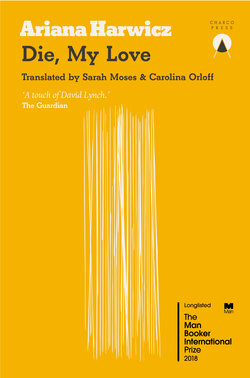Читать книгу Die, My Love - Ariana Harwicz - Страница 6
На сайте Литреса книга снята с продажи.
ОглавлениеMy last memory of the pregnancy is from Christmas. My husband’s whole family had come to stay from towns even more in the middle of nowhere than this one. My stomach was churning, the baby was moving at an abnormal speed, and people had their fingers crossed hoping they wouldn’t have to rush off to hospital with me and leave their turkey-and-apple dinner unfinished. I was standing in the living room in front of the fire. I can’t remember having done anything in particular to reveal how desperate I was feeling. For some time I’d been containing everything, or so I thought, in a swaying motion that was subtle though intensifying, when, suddenly, I was offered a seat and something cool to drink. Since when did sitting down and having some water get rid of the desire to die? Thanks, Grandma. I’m fine though. But they sat me down and brought me the glass of cool water anyway. These people are going to make me lose it. I wish I had Egon Schiele, Lucian Freud and Francis Bacon for neighbours; then my son could grow up and develop intellectually by learning that there’s more to the world I brought him into than opening old skylights you can’t see out of anyway. As soon as all the others had escaped to their rooms to digest their meals, I heard my father-in-law cutting the grass beneath the snow with his new green tractor and thought that if I could lynch my whole family to be alone for one minute with Glenn Gould, I’d do it. Later on I saw him sitting at his desk, going over last month’s supermarket receipts. He read the price of each product and then checked the total with a calculator. By the time he’d finished recording the sums in his log of monthly expenses, the desk lamp was no longer giving off enough light. We ate dinner, all of us together again, and I can still remember the tired, backlit image of an average man who thinks he’s exceptional. After that, he cleaned his dentures and went to bed. And this is a day lived? This is a human being living a day of his life? In his bedroom there’s a rifle; on his night table, a few cartridges. I won’t be killed in my own bed, he says. If I hear noises, I’ll load my gun and go downstairs. And if there’s trouble, I’ll fire. Straight at the feet, he’d say, inhaling the saliva that was always caught in his throat. My mother-in-law watched me all day long, worrying. She didn’t know what else to do when she knocked on my door at dawn and entered timidly with another glass of water and a green-and-white pill. Thanks, I said, and as soon as she left I tossed it into the fire. I don’t like side effects. I don’t like antidepression. The only thing I could do at times like this was hug my womb and wait. The baby was asleep in there, wrapped up in my guts, foreign to me. He wasn’t much help back then either. As soon as the ritual of the raised glasses and well-wishing was over, I tried to escape my husband’s gaze. He was already throwing darts at the bull’s eye on the terrace. Every time he missed a shot he’d say, Arghh! I walked through the living room, which was strewn with wrapping paper, ribbons and other decorations, to the pile of clothes for the unborn child, but I didn’t put anything away. Instead I went out into the woods, exhausted from the contractions. When I think back now, the pain returns, leaping onto me like a dog. The questions asked that Christmas perforated me with more force than hunters’ bullets. Have you been looking for work? Do you think you’ll send the kid to a nursery? Are you paying your taxes? And your health insurance? Do you need any help? I’m finally here. I only ever come down to the woods at night when it’s an emergency. How is it possible for my father-in-law to spend the afternoon before Christmas going over receipts with a firearm under his pillow. How is it possible for my mother-in-law to speak so softly, walk so neatly, be so proper, and yet offer Prozac to a mother-to-be. How is it possible for my in-laws to have slept in the same sheets, under the same duvet and bedspread, in the same wallpapered room, for fifty years. My husband put down the darts and went looking for me in the forested fields. I walk on and shut myself away among the clusters of trunks and saplings. I’m one person, my body is two. Through threads of smoke, I see a small group of gypsies off on their own, camping near the snow-covered pond in a caravan as ramshackle as ours. I see them there, on the ice and frost, smoking and laughing in another language. In the morning, my in-laws will complain about the beer cans and needles left lying around. Beyond are the bee hives with wild honey and the path that leads to the main road. Mushrooms sprout up everywhere after a downpour, and now I can see them rotting. I hope the first word my son says is a beautiful one. That matters more to me than his health insurance. And if it isn’t, I’d rather he didn’t speak at all. I want him to say magnolia, to say compassion, not Mum or Dad, not water. I want him to say dalliance. My husband found me jumping through puddles. I was embarrassed. I said I was just fine and ran back home.
